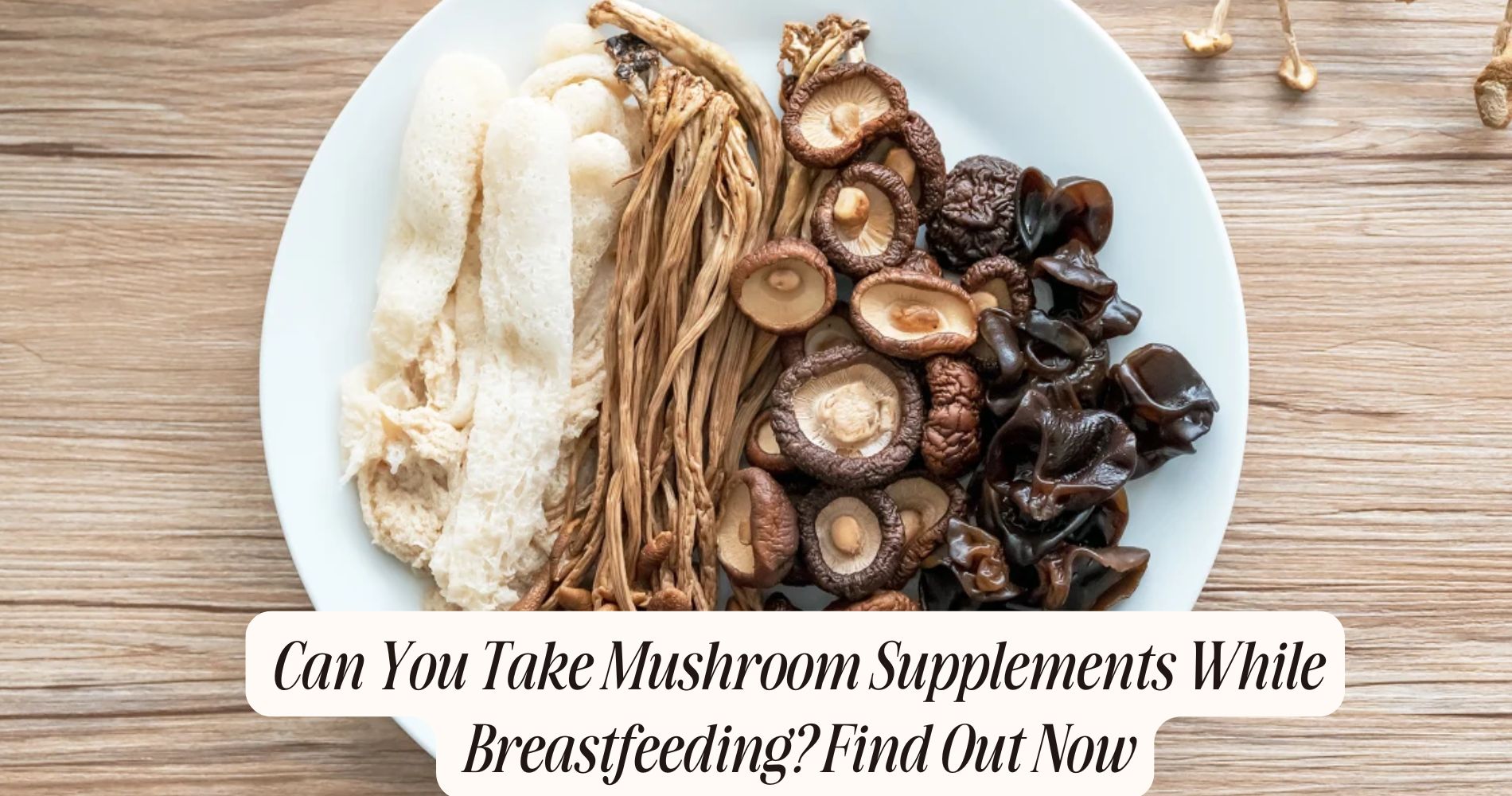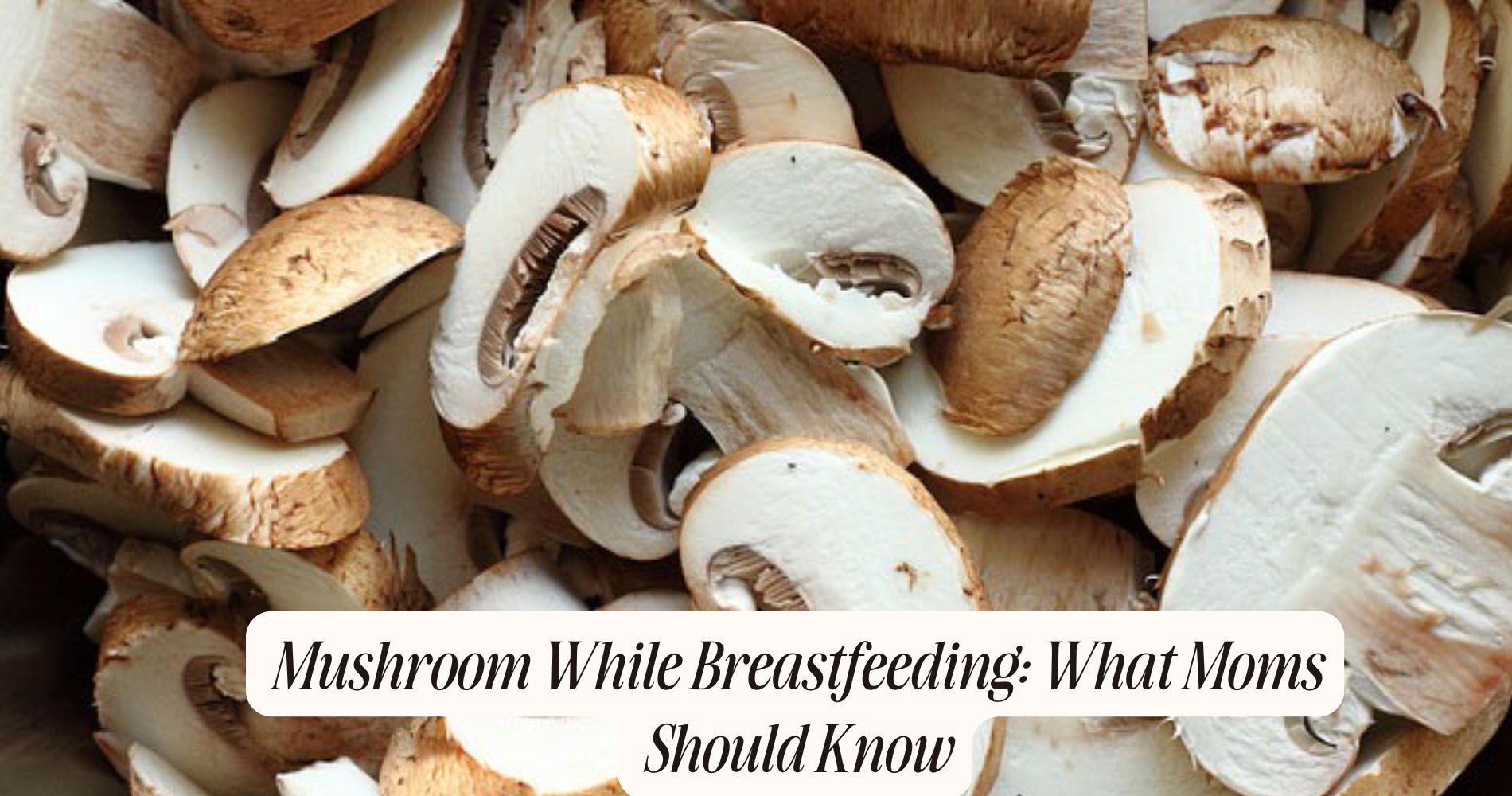
Can You Take Mushroom Supplements While Breastfeeding? Find Out Now
Can you take mushroom supplements while breastfeeding? You should approach mushroom supplements with caution while breastfeeding. Some varieties, like shiitake and reishi, may offer health benefits, but limited research exists on their safety during lactation. Certain mushrooms can affect breast milk's composition or introduce harmful compounds, so it's crucial to consult a healthcare professional before starting any supplements. Allergic reactions are also a risk, especially if you have a family history of allergies. Prioritizing high-quality, tested products is essential. For a safer approach, consider exploring other nutritional options that can support your health and well-being during this important time.
Understanding Mushroom Supplements
Mushroom supplements have gained popularity in recent years for their potential health benefits, particularly among those seeking natural remedies. These supplements come from various mushroom varieties, each offering unique properties that may support your overall well-being.
You might find popular options like reishi, chaga, and lion's mane, which are known for their adaptogenic qualities, immune support, and cognitive enhancement, respectively.

When choosing mushroom supplements, it's important to evaluate the supplement sources. High-quality products often use the fruiting body of the mushroom, which contains a higher concentration of beneficial compounds compared to mycelium.
Look for trusted brands that provide transparency about their sourcing and extraction methods, guaranteeing you're getting the most potent benefits possible.
Additionally, it's essential to consult with a healthcare professional before adding any supplement to your routine, especially while breastfeeding. While many mushroom varieties are deemed safe, individual reactions can vary, and you want to ascertain both your health and your baby's are prioritized.
Common Types of Mushroom Supplements
When exploring the world of mushroom supplements, you'll come across several common varieties that each offer distinct benefits.
Lion's Mane, for instance, is renowned for its potential cognitive enhancement, helping to support memory and focus.
If you're looking for relaxation and stress relief, you might want to take into account the Reishi benefits, often praised for promoting calmness and better sleep.
For those seeking an energy boost, Cordyceps is a popular choice, known for its ability to enhance athletic performance and overall liveliness.
Shiitake mushrooms aren't only delicious but also packed with nutrients that can support your immune system.
Turkey Tail is another supplement that's known for its immune-boosting properties, making it a favorite among health enthusiasts.

Chaga uses include its antioxidant properties, which can help combat oxidative stress, while Maitake properties are linked to blood sugar regulation and immune support.
Ultimately, Agaricus Blazei is valued for its potential to enhance overall wellness and support immune function.
Each of these mushroom supplements brings unique advantages, making it essential to choose one that aligns with your health goals.
Nutritional Benefits of Mushrooms
Mushrooms offer a range of nutritional benefits that can be particularly valuable while breastfeeding.
They're rich in antioxidants, which help combat oxidative stress, and they provide immune system support to keep you and your baby healthy.
Additionally, certain mushrooms are excellent sources of vitamin D, essential for bone health and overall wellness.
Rich in Antioxidants
Packed with antioxidants, mushroom supplements offer a nutritional boost that can be especially beneficial while breastfeeding. These powerful compounds help combat oxidative stress, which can be heightened during this demanding time. By incorporating mushrooms into your diet, you're tapping into their exceptional antioxidant properties that support your overall health.
Mushrooms like reishi, shiitake, and maitake are particularly renowned for their rich content of antioxidants, including ergothioneine and selenium. These elements work to neutralize free radicals in your body, potentially reducing the risk of chronic diseases and inflammation.
The health benefits of these antioxidants extend beyond just physical wellness; they may also contribute to improved mood and cognitive function, which can be vital for new mothers juggling multiple responsibilities.
Moreover, the antioxidant properties of mushrooms can support your body's recovery processes after childbirth. As you're nourishing your baby, taking care of your health is paramount.
Immune System Support
A strong immune system is vital for new mothers, especially during breastfeeding when both mother and baby rely on ideal nutrition. Mushroom supplements provide a range of immune boosters that can support your health and enhance your body's defenses. Many mushrooms, such as reishi, shiitake, and maitake, are rich in beta-glucans, compounds known to activate immune cells and promote a robust immune response.

Incorporating these mushrooms into your diet can serve as natural remedies for maintaining your well-being. They contain antioxidants that help combat oxidative stress, which can weaken your immune system. Additionally, certain mushrooms have anti-inflammatory properties, further aiding in immune function.
As you consider mushroom supplements while breastfeeding, it's important to choose high-quality, reputable sources to guarantee safety for you and your baby.
Always consult a healthcare professional before starting any new supplement regimen to discuss potential interactions and benefits.
Vitamin D Sources
Vitamin D is essential for both you and your breastfeeding baby, and certain mushrooms can be a surprising dietary source of this vital nutrient. While sun exposure is the most natural way to get vitamin D, many people struggle to get enough, especially during winter months or if they live in areas with limited sunlight. This is where mushrooms come into play.
Certain varieties, like maitake and shiitake mushrooms, contain significant amounts of vitamin D, especially when exposed to ultraviolet (UV) light during growth. This exposure can boost their vitamin D levels, making them a valuable addition to your diet. Including these mushrooms in your meals can help guarantee you're meeting your nutritional needs while breastfeeding.
Aside from mushrooms, other dietary sources of vitamin D include fatty fish, fortified dairy products, and egg yolks. If you're concerned about your vitamin D levels, consider discussing supplementation with your healthcare provider. They can guide you on the best dietary choices and whether you need additional support.
Incorporating mushrooms into your meals not only adds flavor but also helps you and your baby thrive with the right nutrients.
Safety of Mushrooms During Breastfeeding
While many new mothers seek natural ways to support their health during breastfeeding, the safety of mushroom supplements is a crucial consideration. When it comes to mushroom safety, you'll want to approach supplementation with caution. Some mushrooms are safe and even beneficial, while others can pose risks.
Breastfeeding guidelines generally recommend that nursing mothers be mindful of what they consume, as certain substances can affect breast milk and, consequently, your baby. While some mushroom varieties, like reishi and shiitake, may offer health benefits, there's limited research on their safety during lactation.
You should always consult your healthcare provider before adding any new supplements to your routine. They can help you weigh the benefits against potential risks.
Additionally, consider sticking to culinary mushrooms that are well-known for safety and nutritional value.
If you're considering supplements, look for high-quality products that are third-party tested and free from contaminants.
Potential Risks for Nursing Mothers
When considering mushroom supplements while breastfeeding, it's essential to be aware of potential risks.
Not all mushroom varieties are safe, and some may affect your milk quality or trigger allergic reactions in you or your baby.
Always consult with a healthcare professional before adding any new supplements to your routine.
Safety of Mushroom Varieties
Although many mushrooms are safe and nutritious, not all varieties are suitable for nursing mothers, and some can pose potential health risks. When considering mushroom supplements, it's essential to distinguish between edible varieties and toxic varieties.
Edible mushrooms, like shiitake, reishi, and maitake, are generally recognized as safe and can even provide health benefits. However, toxic mushrooms, such as those from the Amanita family, can lead to severe health issues, including liver damage and gastrointestinal distress, which could indirectly affect your breastfeeding journey.

As a nursing mother, you should be particularly cautious about the sources of any mushroom supplements you choose. Many supplements may contain a mix of mushroom types, including potentially harmful varieties.
Always opt for products from reputable brands that clearly label their ingredients. If you're unsure, consult with a healthcare provider before adding any mushroom supplements to your routine.
Impact on Milk Quality
Mushroom supplements can greatly influence the quality of breast milk, impacting both nutrients and potential toxins that might affect your baby. When you consume these supplements, they may alter the milk composition, which can affect breastfeeding nutrition.
For instance, certain mushrooms are rich in vitamins and minerals, potentially enhancing your milk's nutritional profile. However, not all mushrooms are safe, and some can introduce harmful compounds or toxins.
Research indicates that some mushroom species may lead to adverse effects in nursing mothers and their infants. These toxins can accumulate in your system, and subsequently, in your breast milk, which could pose risks to your baby's health.
It's essential to be mindful of the specific types of mushroom supplements you consider, as their effects on milk quality can vary widely.
As a breastfeeding mother, prioritizing your baby's health means being cautious about what you ingest. Always consult with a healthcare professional before adding any new supplements to your routine.
Possible Allergic Reactions
While exploring mushroom supplements, it's vital to be aware of the potential for allergic reactions, especially as a nursing mother. Some individuals may have allergies to specific types of mushrooms, which can lead to symptoms like hives, swelling, or difficulty breathing. If you've never taken mushroom supplements before, you should approach them cautiously.
When breastfeeding, your body's immune response can change, making you more susceptible to allergies. Consequently, it's important to reflect on any family history of allergic reactions. If you or your partner have a history of allergies, particularly to fungi, it might be wise to avoid these supplements altogether.
Always consult with your healthcare provider before introducing any new supplements into your routine. They can help you weigh the risks and benefits based on your specific situation.
Additionally, if you decide to try mushroom supplements, monitor yourself for any adverse effects after the first dose.
Taking these breastfeeding precautions can help guarantee your safety and that of your baby. Remember, your health directly impacts your nursing journey, so prioritizing your well-being is key.
Research on Mushrooms and Lactation
Research into the effects of various mushrooms on lactation is limited, yet it offers intriguing insights for breastfeeding mothers. While specific mushroom lactation studies are sparse, some research suggests that certain mushrooms may provide health benefits that can positively influence lactation.
For instance, mushrooms like reishi and lion's mane are believed to support immune function and reduce stress, which can be beneficial for nursing mothers.
When considering mushrooms in your diet during breastfeeding, it's important to follow breastfeeding dietary guidelines. These guidelines generally emphasize the importance of a balanced diet rich in essential nutrients.
Including mushrooms as part of your overall nutrient-dense diet might contribute to your well-being, but moderation is key.
It's also important to note that not all mushrooms are safe. Some wild varieties can be toxic, and even cultivated types may cause allergic reactions in sensitive individuals.
As a breastfeeding mother, you should always prioritize safety and consult with your healthcare provider before incorporating any new supplements or significant dietary changes. Staying informed will help you make the best choices for you and your baby.
Recommendations From Health Experts
Consulting with health experts can provide valuable insights when considering mushroom supplements during breastfeeding. Many professionals urge caution, emphasizing that not all mushroom varieties are safe.
Expert opinions often align with established breastfeeding guidelines, which advise mothers to be cautious about introducing new supplements into their diets.
Experts recommend starting with well-researched mushroom types, such as reishi or lion's mane, when considering supplementation. These mushrooms have been studied for their potential benefits but should be approached with care.

Health professionals typically suggest consulting with a lactation consultant or a registered dietitian to discuss your specific needs and any potential risks.
Additionally, it's essential to avoid any products that contain additives, fillers, or other herbs that mightn't be safe during breastfeeding. Transparency in ingredient sourcing and manufacturing processes is critical.
Ultimately, while mushroom supplements may offer benefits, the consensus among health experts highlights the importance of prioritizing safety and adhering to breastfeeding guidelines.
Always prioritize your health and your baby's well-being by seeking professional advice before making any changes to your supplement routine.
Alternatives to Mushroom Supplements
If you're considering alternatives to mushroom supplements while breastfeeding, there are several options that can provide similar health benefits without the potential risks.
Herbal alternatives like ashwagandha and ginger can enhance your immune system and reduce stress. Ashwagandha, known for its adaptogenic properties, may help combat fatigue and improve overall well-being. Ginger, on the other hand, is great for digestion and can soothe nausea, which some new mothers experience.
Nutritional substitutes are also important to supporting your health. Incorporating foods rich in vitamins and minerals, such as leafy greens, nuts, and seeds, can provide essential nutrients for both you and your baby.
For example, spinach is high in iron and calcium, while flaxseeds are packed with omega-3 fatty acids, vital for your baby's development.
You might also consider probiotics found in yogurt or fermented foods like kimchi and sauerkraut. These can support gut health and bolster your immune system.
Making Informed Choices
Making informed choices about your health while breastfeeding is essential for both you and your baby. When considering mushroom supplements, you need to weigh the potential benefits against the risks. While some mushrooms are known for their health benefits, not all are safe for breastfeeding mothers.
Research on the effects of specific mushroom supplements during lactation is limited, which means you mightn't have all the information you need to make confident breastfeeding choices.
Before adding any supplement to your routine, consult with your healthcare provider. They can help you navigate the available research and guide you towards informed decisions that prioritize your well-being and that of your child.
Pay attention to the source of the supplements as well; quality matters, and contaminants can pose additional risks.
Additionally, consider alternative ways to support your health, such as through diet and lifestyle changes, which may provide similar benefits without the uncertainties of supplements.
Ultimately, your goal should be to make choices that support both your health and your baby's growth. By staying informed and consulting with professionals, you can guarantee you're making the best decisions for your family.
Boost Your Health Safely with SUPER MUSHROOM GUMMIES
As you explore the safety of taking mushroom supplements while breastfeeding, consider trying Well Gummies' SUPER MUSHROOM GUMMIES. This easy-to-use gum chew product is crafted with 10 functional mushrooms, designed to naturally fuel your brain and energize your body. Our vegan gummies provide calmer energy, sharper focus, and immune support, helping you maintain a balanced body and clear mind.
With a delightful fresh wild berry flavor, these gummies taste just like your favorite candy—without the jitters or crash. Enjoy the benefits of mushrooms in a safe, convenient, and tasty way with SUPER MUSHROOM GUMMIES.
Frequently Asked Questions
Are There Specific Mushroom Types to Avoid While Breastfeeding?
While breastfeeding, you should avoid mushrooms known for toxicity, like Amanita species. Stick to safe varieties, such as shiitake or reishi, to guarantee you and your baby stay healthy and protected from potential risks.
How Do Mushroom Supplements Interact With Breastfeeding Medications?
Mushroom supplements can affect breastfeeding medications, so you should prioritize mushroom safety. Consult your healthcare provider to discuss potential interactions and guarantee you're maximizing breastfeeding benefits while minimizing risks to you and your baby.
Can Mushroom Supplements Affect Milk Supply?
Mushroom supplements might influence milk composition, but evidence on their direct effects on milk supply is limited. Prioritize lactation health by consulting your healthcare provider before adding any new supplements to your regimen.
Are There Any Allergic Reactions to Mushrooms During Lactation?
During lactation, you should be cautious about mushroom allergies. While many can safely consume mushrooms, some may experience allergic reactions. Always consult your healthcare provider for guidance on lactation safety regarding specific supplements.
What Dosage of Mushroom Supplements Is Considered Safe for Nursing Mothers?
When considering mushroom supplements, follow nursing guidelines and consult your doctor. Generally, low doses are recommended to enjoy mushroom benefits safely. Always prioritize your health and your baby's well-being by seeking professional advice first.
Conclusion
In summary, while mushroom supplements can offer various health benefits, their safety during breastfeeding isn't well-established. It's essential to consult your healthcare provider before adding them to your diet. They can help you weigh the potential risks and benefits based on your individual circumstances. If you're unsure, consider alternative options that are known to be safe for nursing mothers, ensuring you make informed choices for both you and your baby. Your health and well-being are paramount.




